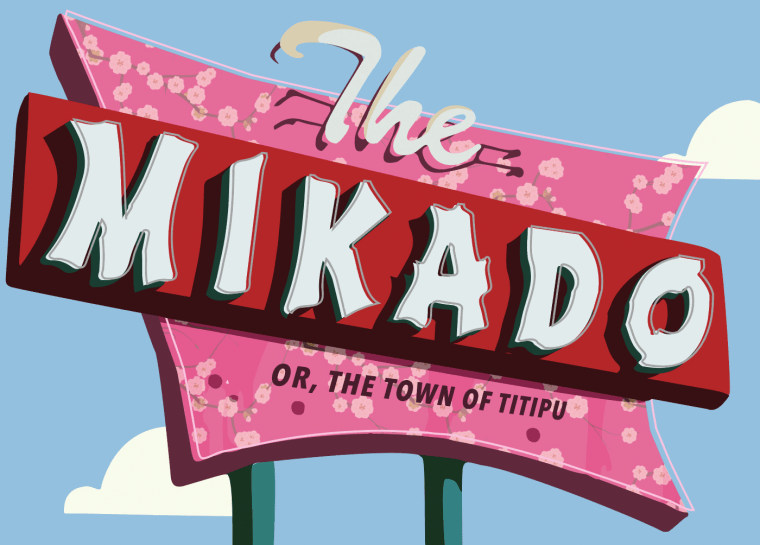A staging of "The Mikado" at Harvard University has prompted public criticism from students on campus who say attempts to "improve" the controversial opera have fallen short — criticism that has divided public opinion on the production's opening weekend.
Harvard junior George Qiao told NBC News he set protests into motion last week after hearing about the upcoming show. Qiao, who attended an open dress rehearsal by the Harvard-Radcliffe Gilbert and Sullivan Players, said he felt the lack of mention in the production about racial issues removes any critical engagement with the problematic history of "The Mikado."
"The version of 'The Mikado' being put on right now, despite being reset in 1960s America, retains Oriental music, infantilized character names, and the song 'Miya Sama,' an appropriation and disparagement of the Japanese language," Qiao said. "There are no consequences or even recognition of such appropriation within the play. If anything, the story wraps up quite happily, as if appropriation were something innocuous and harmless."
Billed as "The Mikado; or the City of Titipu," the Harvard production is set in a "1950s/60s Las Vegas 'Oriental'-themed hotel setting," according to Kathleen Zhou, a Harvard senior who also serves as the president of the Harvard-Radcliffe Gilbert and Sullivan Players.
In an email to NBC News, Zhou described her extensive research into the history of "The Mikado" and postwar Japan, noting the community outreach efforts she and the group have engaged in over the year — including the open dress rehearsal — in order to address any concerns about the production. On the Harvard-Radcliffe Gilbert and Sullivan Players' website, post-show "talk backs" are listed as part of the group's efforts to encourage discussion.
"One thing that’s important to note is that the original show is a satire that renders the characters in the show ridiculous in an effort to lampoon Victorian mores. However, since the show uses an 'exotic' and 'other' setting to soften the directness of the satire, the satire can often feel like it’s directed towards Japaneseness, rather than Britishness, which was the original intent," Zhou told NBC News.
Zhou noted that by setting "The Mikado" in a location that "evokes the commodity of racism of the show's origins," the new production allows for an opportunity to teach about the origins of the show.
"[It] 'flips the script,' so to speak, especially since the idea of an 'Oriental' hotel just seems so tacky to modern sensibilities. The characters are still rendered ridiculous, but there is no longer an ambiguity that Japaneseness is the subject of ridicule, as in traditional yellowface productions. Rather, it is the act of appropriation of Japanese (and even Chinese) culture that is both rendered ridiculous and criticized as violent," Zhou said.
But Qiao disagrees, calling out some of the show's antics which include "large amounts of alcohol" and "jokes about killing themselves off."
"Yes, characters make references to Eric Clapton and run around knocking things over. Sure, it's absurd, but that's not exactly any sort of achievement," Qiao said. "As it stands, this rendition is neither subversive nor critical, and is innovative only in its attempts to hide its own history."
In an email to NBC News, Harvard senior Ashley Zhou, who has worked with the Harvard-Radcliffe Gilbert and Sullivan Players this year on community outreach, said she felt the critiques that protesters have made were fair, but urged critics to take a step back and view the bigger picture surrounding the production too.
"I think that this production has made a substantial effort to problematize the original show," Ashley Zhou said, noting that the criticism about how the Players "did not go far enough in their reinterpretation or didn't do enough for outreach, while valid, also sounds reminiscent of hegemonic forces placing the onus of racial uplift on people of color."
"It's important to me to recognize that this production and organization is led by an Asian American woman," Ashley Zhou said, "and that her serious engagement with the racist source text of "The Mikado" has sparked so much attention and conversation amongst a racial group too often incorrectly perceived as apolitical."
This is not the first time protests have targeted the Gilbert & Sullivan opera. In 2014, a production of "The Mikado" in Seattle, Washington, gained national attention following criticism and protests over the Seattle Gilbert and Sullivan Society's staging — which critics say highlighted offensive caricatures while also failing to include Asian-American actors.
In an op-ed for the Seattle Times, Sharon Pian Chan called the opera "yellowface, in your face," and said it was a "fossil from an era when America was as homogeneous as milk, planes did not depart daily for other continents and immigrants did not fuel the economy."
Actor Greg Watanabe, whose recent credits include Broadway's "Allegiance," told NBC News at the time of the controversy that the company's decision to produce the play was "willfully ignorant" — a point of criticism that Seattle Gilbert and Sullivan Society producer Mike Storie pushed back on in an interview with MSNBC's Richard Lui.
"We're not putting down Japanese," Storie said. "We're trying to invoke an image of Japan as it may have been 130 years ago."
Similar backlash last year led to the cancellation of a planned production of "The Mikado" by the New York City Gilbert & Sullivan Players.
Follow NBC Asian America on Facebook, Twitter, Instagram, and Tumblr.
